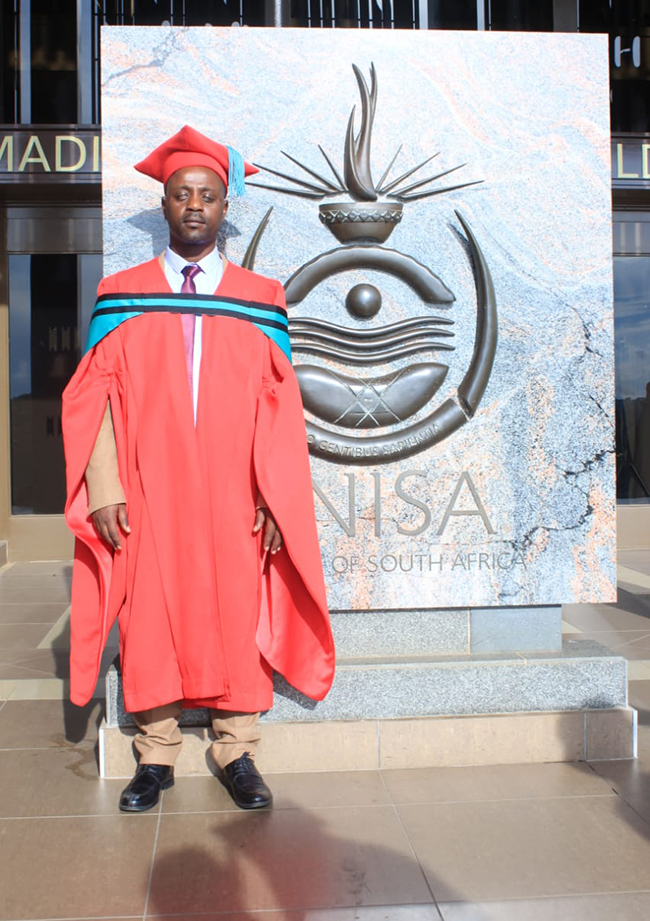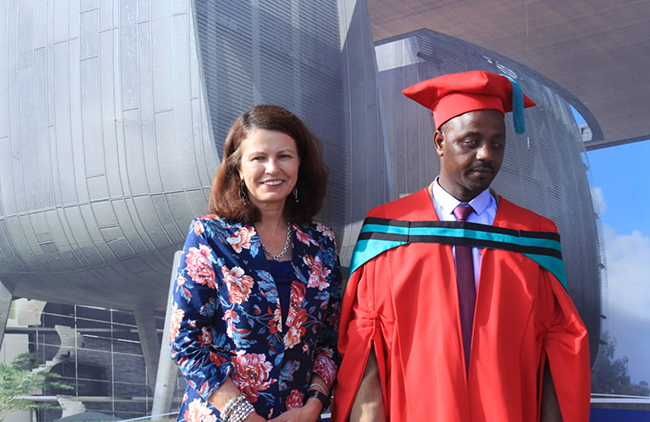News & Events
Unisa gives hope to students with disabilities
Getachew Geno Alala, a visually impaired student from Ethiopia, is officially a doctor now, having recently graduated with a PhD in Education from Unisa. Alala, who chose to graduate at Unisa’s main campus in Muckleneuk, Pretoria, said: “I had a dream of coming to South Africa and being part of the graduation history at the original location of my university, Unisa. I wanted to take pictures on the main campus and understand the history, culture and education system of South Africa.’’

Dr Getachew Geno Alala, Unisa PhD graduate from Ethiopia
Alala’s dissertation, entitled “Factors affecting students’ oral proficiency”, focuses on students in all disciplines – especially first-year university students who struggle to communicate in English. He explains that speaking English in his country is a challenge since it is not widely spoken. For him it is important to address the issue, since his country is host to the African Union (AU), and knowing how to speak English is important for establishing effective communication between nations. Although Alala continues to encourage others to become fluent in their mother tongue and to be proud of it, in his view, English is still of importance.
Alala is a Lecturer in English and Literature at Wolaita Sodo University in Ethiopia, as well as the Coordinator of the institution’s Disability Centre. He is also actively involved in community service research programmes. As a visually impaired individual, he is passionate about raising awareness of the challenges facing people with disabilities, and how they can be assisted, especially in ensuring that they are successful at their studies.
He explains that he chose Unisa because, for him, it is the best university, with excellent facilities for students with disabilities. He points out that Unisa is very accommodative of students and visitors with disabilities. Alala’s wish is to create a sustainable relationship with Unisa's Advocacy and Resource Centre for Students with Disabilities (ARCSWiD), in order to exchange ideas and enhance public awareness of how to deal with disability issues.

Prof. Marietha Nieman (left), Unisa’s Department of Language Education, Arts and Culture and Dr Getachew Geno Alala (right)
“In my country, it is not easy to pursue your studies if you are visually impaired, but what assisted me was that Unisa has a regional centre in Ethiopia, which makes it easy to access a lot of resources. I would like to thank my former supervisor, Professor Mathipa Elias, and my co-supervisor, Professor Marietha Nieman, both from Unisa’s Department of Language Education, Arts and Culture. When I told them I was visually impaired, they encouraged and supported me every step of the way, while establishing effective communication between us. Unisa is indeed my university, which is why I chose it from a list of international institutions,’’ Alala explained.
Among other measures to aid visually impaired students, ARCSWiD provides application and registration assistance where students need to fill out forms or apply for bursaries – it even refers students for counselling, if needed. The centre also provides study material in braille, large print, audio and electronic format, and digital accessible information system (DAISY) format. It also offers orientation and mobility training to help students get to campus and return home; and renders assistance when students graduate, by producing all their material in alternative formats such as braille.
Alala admits his dream was to learn – not necessarily to become a doctor – but his dream kept expanding. He urges everyone to further their education, as it enhances personal and professional development, and suggests that being familiar with technology is key for improving one’s skill-sets. In his view, the available software programmes go a long way in making studying easier for people with disabilities.
“We need to be aware of and educated about different types of disabilities, whether they be physical or mental. I respect South Africa, because it is richer and better resourced than other African countries. I hope South Africans will make good use of those resources. Nothing is impossible in this world: you need to have dreams and you need to be willing to work hard to achieve them. Never stop learning.’’
*By Nancy Legodi, Acting Journalist, Publications: Department of Institutional Advancement
Publish date: 2019-11-20 00:00:00.0

